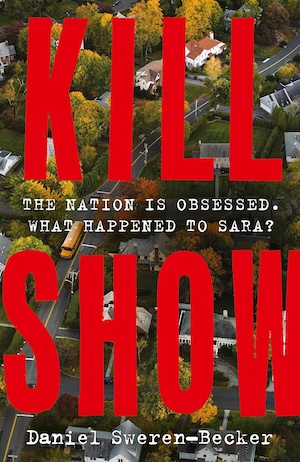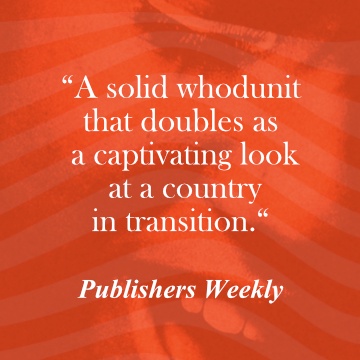
Author Daniel Sweren-Becker must have been well tuned in to the zeitgeist when he conceived Kill Show, his newly published ‘true crime’ novel, as it delves into growing critiques of the genre. Before you think that description is an oxymoron, this is definitely fiction, but written in the style of a television documentary script. It consists almost entirely of short statements from 26 of the story’s principals, with no descriptions unless a character happens to provide one. Ten years after the events of the story, the participants are re-interviewed. The book is their testimony.
A decade earlier, in suburban Frederick County, Maryland, 16-year-old Sara Parcell disappeared. Her parents and brother panicked. Her friends were bereft. School officials tried to figure out the best way to respond. Local police were baffled.
Now, they still talk about Sara, her family, the community, the disappearance and its aftermath, as they amplify, contextualise, and at times contradict each other. Piece by piece, the story comes into focus.
Early on, Sara’s dad, Dave Parcell, waves his bank statement in front of the cameras camped outside his home. He has $1762. That’s all. But he’ll put it up for a reward. A dramatic moment the news cameras caught, but not as viral as the video Sara’s brother Jack makes a few moments later, showing Dave and his wife Jeannette back in the house, embracing, Jeannette in hysterics.
Across the country in Hollywood, Casey Hawthorne, a reality TV show producer, sees Jack’s video and instantly has a brilliant programming idea. She convinces her boss to pay for her and a production crew to fly to Maryland, and then convinces the Parcell family that a reality television program – Searching for Sara – will bring massive attention to the disappearance and help get their daughter back.
They are desperate. They agree. To say Casey Hawthorne is full of herself, manipulative and not to be trusted hardly describes the extent of the void in her character. Once in Maryland, right at the start, she makes a strategic choice that negatively influences everything that comes afterward. She meets Detective Felix Calderon in a bar, and, rather than revealing why she’s really in town, she lies. And sleeps with him. As a result, when aspects of the case start to deteriorate, the lead detective on the case has no credibility with the public, the police or the prosecutor.
Of course, many more people involved in this debacle are lying. And, if not lying, they’re at least not telling the whole truth or they’re shading it to justify their actions. Many characters undergo a shift in perspective over the course of the weeks the search drags on and shocking revelations emerge; others seem incapable of it. In the end, there’s reason for quite a few Frederick County residents to take a hard look at the role they played in the outcome. Undoubtedly, the television show had a warping effect on everyone – interviewees, law enforcement, the production crew, and viewers themselves.
When Sweren-Becker wants to delve into ethical grey areas, he provides comments from a pop culture critic or a sociology professor. In that way, the novel reads very much like a real television documentary – mostly about the people directly involved, with occasional expert analysis. This device never becomes tedious or heavy-handed.
Meanwhile, in real life, true crime dramas have come in for criticism, even though they’re still immensely popular. A 2014, the 13-episode podcast, Serial, about the murder of a Maryland teenager, was downloaded more than 340 million times in the first four years of its availability. Sweren-Becker’s story effectively presents criticism of this approach: exploiting real people for entertainment, looking for sensation rather than examining systemic problems and objectifying victims. Casey Hawthorne’s Searching for Sara is definitely guilty on the first two counts. If you have your own reservations about the public obsession with true crime shows, this book will confirm them.
Kill Show raises interesting social questions, but does so in a way that demonstrates the characters’ humanity – their vulnerability, their culpability, their tunnel vision– that so easily led them into ill-advised actions when Sara went missing. The characters have had a decade to think this through and erect their defences and hone their rationalisations. You can imagine that happening too. Partly due to the format and partly to the compelling situation, this is a quick read, yet a profound one.
True crime podcasting is a popular topic in crime fiction. Also see Paul Cleave’s The Pain Tourist or Denise Mina’s Conviction.
Hodder & Stoughton
Print/Kindle
£4.99
CFL Rating: 5 Stars


Using these associate/affiliate links helps support our site.









